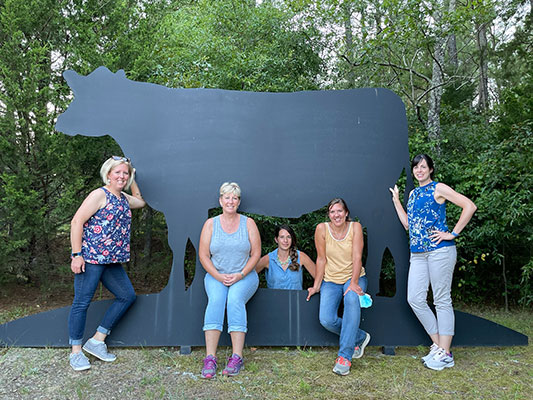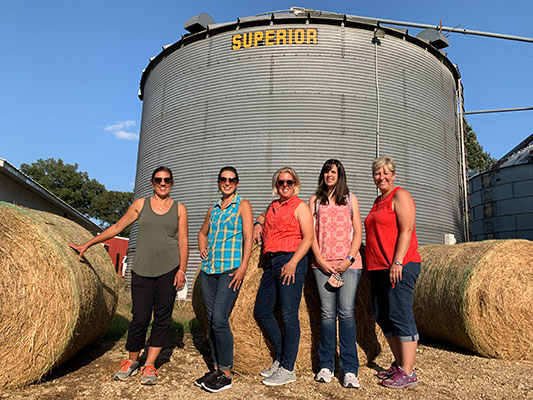
A team of BKW educators selected by the American Farm Bureau Federation and American Farm Bureau Association for Agriculture to participate in a series of On The Farm STEM Experience webinars and a capstone August conference in Nashville, Tenn., are bringing those experiences and knowledge to campus and curriculum.
The program was funded by a grant written by Michaela Kehrer, agriscience teacher/FFA advisor, and Sarah McArdle, fifth grade teacher/FFA advisor, who participated as Team New York along with Bonnie Kane, college and career readiness coordinator; Carey Raymond, elementary teacher; and Donna McGovern, high school life science teacher.
They were one of just six teams from across the nation to take part in On the Farm STEM Experience, which was sponsored by the Beef Checkoff, American Farm Bureau Foundation for Agriculture and NextGenScience.
“The mission of this immersive experience was to build awareness, understanding and a positive public perception of agriculture through education,” said McGovern. “Team New York took part in several webinars at the close of last school year before traveling to Nashville, Tenn., to join teams from Utah, Georgia, Tennessee, Missouri and New Jersey for a four-day tour of Tennessee farms.
“Teachers were able to observe the agricultural process from the beginning with a trip to McWherter Farms, where they learned about artificial insemination and embryo transfer in black angus to breed the cattle with greater, high-quality beef,” she said.
“Our next stop was the University of Tennessee-Martin, which involved learning more detail about a cow’s reproductive cycle. We were able to practice the technique of artificial insemination with preserved cow uteruses, view the areas where necropsies were performed and begin to apply the concepts we were learning about agriculture into phenomena to align with the NextGenScience standards,” McGovern said.
“Our day ended with a visit to Yeargin Farms. The Yeargins showed us how they raise and store a variety of crops to feed their livestock. We were also able to see how cattle are vaccinated and the equipment that assists the farmers in this process.
“Day two commenced with a tour of Tennessee Farmers COOP Feed Mill. We were able to see how the methods of distributing feed varied from bulk to bag, including how medications can be administered to livestock via feed. Due to advancements in technology, we saw how robotic arms play a role in stacking the bagged feed onto pallets to be trucked off to local farms. Working with other teams from across the country, the afternoon was spent fleshing out how our phenomena correlated to the NextGenScience standards at Lone Oaks Farm.
“Our final day,” McGovern said, “was spent touring Yoder Brothers Processing. Here, we observed some of the techniques of how meat is processed and the role of the USDA in approving if meat is fit for human consumption. This concluded our cycle in a cow’s life.
“We are excited to bring back much of this knowledge to our classrooms. It is our hope that by engaging our learners in relevant, unbiased instruction we can help them understand where their food comes from and the desperate need for people to choose careers in agriculture to feed the world’s growing population.”
McGovern explained that the team worked to write cross-disciplinary curriculum for the Next Gen. Science standards that spanned all grade levels. The curriculum incorporates observation-based and experience-based learning, and BKW teachers will be implementing new lessons this school year.
BKW’s expanding AgriSTEAM (agriculture, science, technology, engineering, arts and math) offerings and FFA programs benefit students in all grade levels and reflect both the area’s rich agricultural heritage and today’s multi-disciplinary approach to agricultural education and diverse career offerings.


You must be logged in to post a comment.